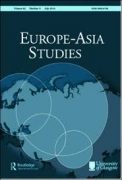This article, co-authored with Annemarie Peen Rodt and published in Europe-Asia Studies, discusses the meaning of self-determination in its historical and contemporary contexts and examines the different options available for the accommodation of contested self-determination claims. Among these, the creation of a new state, arguably, is the most radical of options and one that has significant regional and global implications beyond the territory to which it is applied. Detailing these implications in relation to the case of Kosovo, we make a broader argument that, even if secession is one mechanism to resolve self-determination disputes, this does not do away with the need to continue exploring settlements short of secession as alternatives to changing established international boundaries.
This article is part of a special issue on Self-determination after Kosovo.

